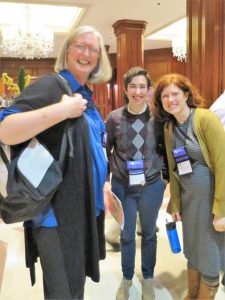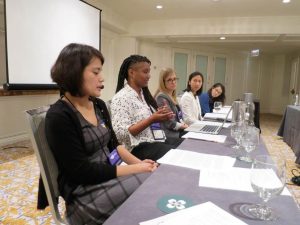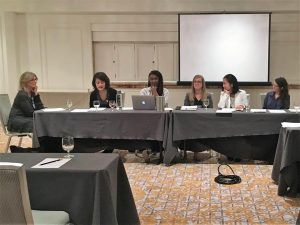by Rachel Karen
On Friday, February 16, the Sociology department’s Power, History, and Society (PHS) working group hosted its PHS Annual Distinguished Lecture featuring Professor of Sociology Myra Marx Ferree from the University of Wisconsin-Madison. Dr. Ferree discussed her comparative work on feminism and higher education in the United States and Germany, and provided an overview of the dialectic inherent in feminism. She pointed to two major university transformations during the last century. First, the potential student body is larger and more diverse. Second, the feminist movement went beyond expanding women’s access to education, by enabling women to learn what they want to know, and be able to find employment afterwards. This access was crucial for women to both join professoriate and institutionalize the creation of new knowledge in the creation of Women and Gender Studies programs. The second transformation driving the restructuring of higher education was decolonization. Former colonial subjects also want access to knowledge on a more self-determined basis, and technological advances helped facilitate international research.
Ferree then turned to her work on the feminist agenda in American and German universities. Here, she brought in a discussion of the dialectic in feminism. She conceptualized two models of feminist intervention based on two characters—Cassandra, who in Greek mythology was cursed to speak true prophesies that no one believed, and Pollyanna, a character from a 1913 novel whose name is now used to describe those who always have a positive outlook. The “Cassandra approach” is combative and critical, and the “Pollyanna approach” holds that by accessing power structures, change can happen from the inside. Dr. Ferree urged us all to recognize both approaches are right, and both are limited. She acknowledged that feminist knowledge production emphasizes change as the only constant. Globalization is not a unidirectional process of modernity: globalization is part of a contested struggle about whose knowledge counts.
For Dr. Ferree, pragmatic feminist advocacy means efforts should be concentrated at the national level, in order to focus on institutionally specific structures to be able to act and make change. Universities are a place of citizenship, and Dr. Ferree believes democratic norms can be used to challenge all academic inequalities. Furthermore, feminists should identify where market leverage exists for specific policy changes, since in this era of academic capitalism, administrators must create a university that can work and compete in the market. Because of this, Dr. Ferree is hopeful that feminists can indeed enact positive change at the university level.
Rachel Karen is a first-year doctoral student in the Department of Sociology. Her research interests include state formation in Africa and European responses to the 2008 economic crisis.




